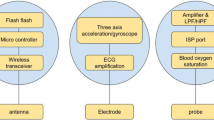Abstract
Predicting future performance is an important part of research into sports' future growth methods. Physiological and biochemical data may now be monitored in real time thanks to state-of-the-art wearable sensors. This research offers a novel approach, based on machine learning and an optical quantum model, to improving player wearable sensor-based sports performance. Here, data on player efficiency was collected and evaluated by optically-mounted sensors. After that, component vector multilayer transfer modelling is used to identify and classify data features using a quantum modelling based adversarial encoder neural network. Experimental analysis is performed for a number of sports performance datasets using metrics including accuracy, precision, MSE, area under the curve, and F-1 score for making predictions. The wearable solution was designed, built, calibrated, and tested in a laboratory environment, where it was shown to be accurate in tracking the expected pattern of an ankle plantar-dorsi-flexion movement during gait. Prediction accuracy was 95%, precision was 88%, MSE was 51%, area under the curve was 81%, and the F-1 score was 85% using the proposed method.







Similar content being viewed by others
Data availability
All the data’s available in the manuscript.
References
de Fátima Domingues, M., Rosa, V., Nepomuceno, A.C., Tavares, C., Alberto, N., Andre, P., et al.: Wearable devices for remote physical rehabilitation using a Fabry–Perot optical fiber sensor: ankle joint kinematic. IEEE Access 8, 109866–109875 (2020)
De Fazio, R., Mastronardi, V.M., De Vittorio, M., Visconti, P.: Wearable sensors and smart devices to monitor rehabilitation parameters and sports performance: An overview. Sensors 23(4), 1856 (2023). https://doi.org/10.3390/s23041856
Ferrari, A., Micucci, D., Mobilio, M., Napoletano, P.: Deep learning and model personalization in sensor-based human activity recognition. J. Reliab. Intell. Environ. 9(1), 27–39 (2023)
Hassan, M.M., Uddin, M.Z., Mohamed, A., Almogren, A.: A robust human activity recognition system using smartphone sensors and deep learning. Futur. Gener. Comput. Syst. 81, 307–313 (2018)
Kańtoch, E.: Recognition of Sedentary Behavior by Machine Learning Analysis of Wearable Sensors during Activities of Daily Living for Telemedical Assessment of Cardiovascular. Risk Sens. 18(10), 3219 (2018). https://doi.org/10.3390/s18103219
Kaur, B., Kumar, S., Kaushik, B.K.: Novel Wearable Optical Sensors for Vital Health Monitoring Systems—A Review. Biosensors 13(2), 181 (2023). https://doi.org/10.3390/bios13020181
Kazanskiy, N.L., Butt, M.A., Khonina, N.S.: Recent advances in wearable optical sensor automation powered by battery versus skin-like battery-free devices for personal healthcare—A review. Nanomaterials 12(3), 334 (2022). https://doi.org/10.3390/nano12030334
Mekruksavanich, S., Jitpattanakul, A.: Multimodal Wearable Sensing for Sport-Related Activity Recognition Using Deep Learning Networks. J. Advan. Inform. Technol. 13(2), 132–138 (2022)
Patalas-Maliszewska, J., Pajak, I., Krutz, P., Pajak, G., Rehm, M., Schlegel, H., Dix, M.: Inertial sensor-based sport activity advisory system using machine learning algorithms. Sensors 23(3), 1137 (2023). https://doi.org/10.3390/s23031137
Zhang, X., Wang, C., Zheng, T., Wu, H., Wu, Q., Wang, Y.. 2023. Wearable optical fiber sensors in medical monitoring applications: A Review. Sensors 23(15), 6671. https://doi.org/10.3390/s23156671
Sun, W.: Predictive analysis and simulation of college sports performance fused with adaptive federated deep learning algorithm. J. Sens. 2022, 1–11 (2022)
Zhang, W., Su, C., He, C.: Rehabilitation exercise recognition and evaluation based on smart sensors with deep learning framework. IEEE Access 8, 77561–77571 (2020)
Funding
No funding.
Author information
Authors and Affiliations
Contributions
Feng Du—Conceived and design the analysis; Writing-Original draft preparation; Collecting the Data; Contributed data and analysis stools; Performed and analysis, Performed and analysis; Wrote the Paper; Editing and Figure Design.
Corresponding author
Ethics declarations
Conflict of interest
The authors declare that they have no known competing financial interests or personal relationships that could have appeared to influence the work reported in this paper.
Ethical approval
This article does not contain any studies with animals performed by any of the authors.
Additional information
Publisher's Note
Springer Nature remains neutral with regard to jurisdictional claims in published maps and institutional affiliations.
Rights and permissions
Springer Nature or its licensor (e.g. a society or other partner) holds exclusive rights to this article under a publishing agreement with the author(s) or other rightsholder(s); author self-archiving of the accepted manuscript version of this article is solely governed by the terms of such publishing agreement and applicable law.
About this article
Cite this article
Du, F. Enhancing sports performance through quantum-based wearable health monitoring data analysis using machine learning. Opt Quant Electron 56, 250 (2024). https://doi.org/10.1007/s11082-023-05800-x
Received:
Accepted:
Published:
DOI: https://doi.org/10.1007/s11082-023-05800-x




